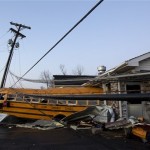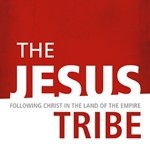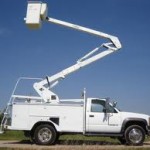 I usually stay out of direct theological arguments, though I like to occasionally stir the pot. I cannot ignore, however, John Piper’s recent post regarding the terrible tornado outbreak of late February/early March 2012.
I usually stay out of direct theological arguments, though I like to occasionally stir the pot. I cannot ignore, however, John Piper’s recent post regarding the terrible tornado outbreak of late February/early March 2012.
Piper asked, “Why would God reach down his hand and drag his fierce fingers across rural America killing at least 38 people with 90 tornadoes in 12 states, and leaving some small towns with scarcely a building standing, including churches?” He answers his own question, “We do not ascribe such independent power to Mother Nature or to the devil. God alone has the last say in where and how the wind blows. If a tornado twists at 175 miles an hour and stays on the ground like a massive lawnmower for 50 miles, God gave the command. Jesus rules the wind. The tornadoes were his.”
Thank you dear John for your compassion.
Below is an article I wrote one year ago after the deadly earthquake and tsunami in Japan. Many of the same Piper-like theological conclusions were drawn then, so there’s no need for me to reply differently than what I said then.
# # # # #
“Maybe God finally got the attention of the Japanese,” a lady said to me in the aftermath of the recent Tōhoku earthquake and tsunami. After I peeled myself off the ceiling, I asked her what in the world she meant by such a statement. She went on to speak about idolatry, the evil Buddha, and Pearl Harbor. When she finished I resumed my place on the ceiling tiles.
It happens every time a major natural disaster strikes, and it doesn’t matter if it is in Japan, Europe, Haiti or New Orleans. Pontificating preachers, tawdry televangelists, and their minions begin pointing fingers, blaming the victims, and speaking of God’s raging vengeance. Even insurance companies get in on the fault-finding, referring to otherwise inexplicable disasters as “acts of God.”
An act of God? Really? What about the crashing of tectonic plates, the inherent danger of living on a coastline prone to major hurricanes, the tornadic collision of cold fronts with warm air over the Great Plains, and the natural eruption of lava from the earth’s crust? These are native conditions of our planet, not the fickle trigger finger of an angry God.
I know that is not the response for which many Christians are looking, because we want intractable answers to all of our questions. We want to be able to provide all the divine reasons for justice/injustice in the world (even when we are incapable of discerning the divine or justice). And we hold on to words like God’s “control, sovereignty,” and “judgment” over the world as a thin defense mechanism when we have no other explanation.
I’m not saying that God isn’t sovereign over Creation. But I am saying that we don’t understand what that means, and we have no business whatsoever sitting in judgment over those who now face unfathomable suffering. Granted, I can’t unravel the enigma that is a loving God presiding over an often unjust world, but I cannot accept the “act of God” explanation for so much misery.
I do not believe that it was God who caused the Japanese earthquake. Rather, it is God who will now enter the sorrow and be with those victimized by it. It was not God, who with a cosmic breath forced the ocean waters onto the Tōhoku shore. Rather, it is God who now weeps with those left to bury the dead. It was not God who systematically and vindictively planned this disaster. Rather, it is God who will be with the Japanese every step of the recovering process in a life that is terribly unjust. How will God do this – join those who suffer? Through you and me.
As a Christian, I believe that the greatest divine revelation is the appearance of Christ, who showed us in the flesh what God is really like. Sent from God on a truly earth-shaking mission of grace, he now sends his followers to do the same. “As the Father sent me,” Jesus said, “I am sending you.”
I can’t hear those words, or witness human suffering, without thinking of my friend Walt DeNero, former Director of the University of Georgia’s Fanning Leadership Center. He used to tell a story every time he gave a lecture, a story about two log-sitting turtles, discussing world events. One turtle said, “I wonder why God allows so much suffering in the world? Sometimes I’d like to ask him ‘why’ when he could do something about it.” The other turtle then said, “Well, why don’t you ask God that question?” And the first one responds, “No. I am afraid God might ask me the same thing.”
Quit wondering if God got the attention of the Japanese. Ask instead, “Did God get my attention?” For now is the time to give, to help, to love, and to become the hands, feet, heart, and compassion of God to those who hurt. Now is the time to redefine “act of God,” not as a cataclysmic disaster of the divine kind, but as a deed of love and grace toward those who need it most.
Ronnie McBrayer is a syndicated columnist, speaker, and author of multiple books. You can read more and receive regular e-columns in your inbox at www.ronniemcbrayer.net.

